Semrush vs Ahrefs? Which tool excels at catering to your SEO and digital marketing needs?
As a digital marketer who has spent years optimizing websites and helping businesses grow their online presence, I’ve had extensive hands-on experience with both Semrush and Ahrefs. These two powerhouse platforms consistently rank as the most popular SEO and digital marketing tools in the industry, and for good reason.
Over the years, I’ve used both tools daily – Semrush for keyword research and competitive analysis, and Ahrefs for its robust backlink analysis capabilities. In this detailed comparison, I’ll share my real experience using both platforms to help you make an informed decision about which tool might better suit your needs.
By the end of this guide, you’ll have a clear understanding of which tool aligns better with your specific needs and budget.
Semrush vs Ahrefs: Key Takeaways
Before diving deep into the details, here are the essential points I’ve learned from using both platforms:
- Semrush offers a marketing suite with additional tools for PPC, social media, and content marketing, while Ahrefs excels in SEO-specific features and backlink analysis.
- Ahrefs has a cleaner, more intuitive interface that’s easier for beginners to navigate, but Semrush provides more detailed data visualization and reporting options.
- Semrush pricing starts at $139.95/month, whereas Ahrefs costs $129/month
- Semrush offers more generous daily reporting limits and a 14-day free trial option, while Ahrefs uses a credit-based system that might require additional payments if you exceed your limit.
Semrush vs Ahrefs: A Quick Comparison
Before we dive into the nitty-gritty details, let’s compare these tools side by side. From my experience using both platforms, here’s how they stack up against each other in key areas:
| Feature | Semrush | Ahrefs |
|---|---|---|
| Keyword Database | 22.3 billion keywords | 7 billion keywords |
| Backlink Database | 43 trillion backlinks | 30.6 trillion backlinks |
| Daily Reports | 3,000+ (entry plan) | 500 credits monthly (with entry plan) |
| Search Engines | Google only | 10 search engines, including Google, YouTube, Amazon |
| Free Trial | 14-day trial available | No free trial |
| Customer Support | Email, chat, phone | Email, chat |
| Base Plan Price | $139.95/month | $129/month |
| Key Strength | All-in-one marketing suite | Superior backlink analysis |
Pros And Cons Of Semrush vs Ahrefs
From my extensive experience using both tools, here’s a balanced look at their strengths and limitations.
Semrush Pros
- Comprehensive all-in-one marketing suite with tools for SEO, PPC, and social media
- Generous daily reporting limits (3,000+ reports on basic plan)
- Excellent keyword intent data and content optimization tools
- Built-in outreach tools for link-building
- Superior competitor analysis across multiple marketing channels
- A 14-day free trial is available
- Professional white-label reporting options
Semrush Cons
- Higher starting price point ($139.95/month)
- Steeper learning curve due to numerous features
- Can be overwhelming for SEO beginners
- Additional user seats are expensive ($45/month per user)
- Only focuses on Google search data
Ahrefs Pros
- Clean, intuitive interface that’s easier for beginners
- Superior backlink analysis capabilities
- Unique traffic potential metric for better keyword prioritization
- Data from multiple search engines (including YouTube and Amazon)
- Faster data loading and processing
Ahrefs Cons
- No free trial available
- Fewer features for non-SEO marketing activities
- Additional costs for daily rank tracking updates
- Basic plans miss out on important features
Who Should Use Semrush?
Marketing agencies and consultants who:
- Manage multiple client accounts
- Need comprehensive marketing reports
- Work across SEO, PPC, and social media
- Require white-label reporting options
Digital marketing teams that:
- Handle various marketing channels simultaneously
- Need detailed competitive analysis
- Focus on content marketing and SEO together
- Require regular automated reporting
Large businesses and enterprises who:
- Want all marketing tools under one roof
- Need detailed market research capabilities
- Require comprehensive competitor tracking
- Have multiple team members needing access
Content marketing professionals who:
- Need in-depth keyword intent data
- Want AI-powered content optimization
- Require content gap analysis
- Focus on content strategy and planning
Who Should Use Ahrefs?
SEO specialists and professionals who:
- Focus primarily on technical SEO
- Need detailed backlink analysis
- Want accurate traffic potential estimates
- Work across multiple search engines
Bloggers and content creators who:
- Need straightforward keyword research
- Want to identify content opportunities
- Focus on organic traffic growth
- Require content performance tracking
Small to medium-sized businesses who:
- Have a dedicated SEO focus
- Work with limited marketing budgets
- Need user-friendly interface
- Don’t require extensive marketing features
E-commerce website owners who:
- Need Amazon keyword research
- Want to track product rankings
- Focus on competitive analysis
- Require backlink monitoring
Semrush vs Ahrefs: Detailed Comparison
Having used both tools extensively for various client projects, I’ll share my hands-on experience with each major feature. I’ll walk you through real examples and scenarios where each tool shines or falls short.
1. Dashboard Overview
When you first log into Semrush, you will see an overview of all features that might seem overwhelming to newcomers. The left sidebar contains all tools, organized into categories like SEO, Content Marketing, Market Research, and more. While the information is extensive, it took me some time to get comfortable navigating through everything.
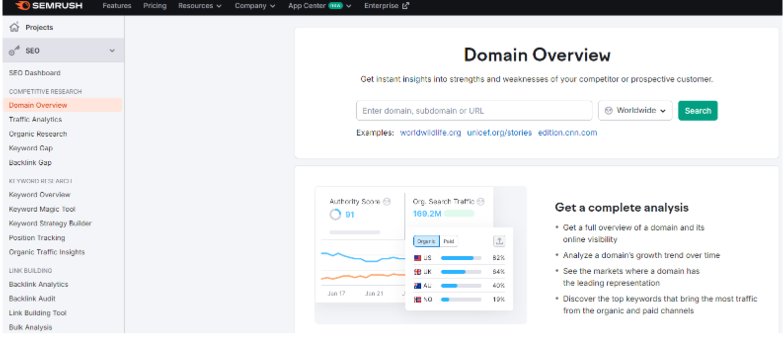
What I appreciate about Semrush’s dashboard is how it presents key metrics upfront:
- Project overview with main SEO issues
- Position tracking updates
- Recent reports
- Site health score
- Key competitors
In contrast, when you open Ahrefs, you will be greeted with a cleaner, more streamlined interface. The main navigation sits at the top, with clear sections for Site Explorer, Keywords Explorer, Site Audit, and Rank Tracker. I found this layout more intuitive and easier to navigate from day one.
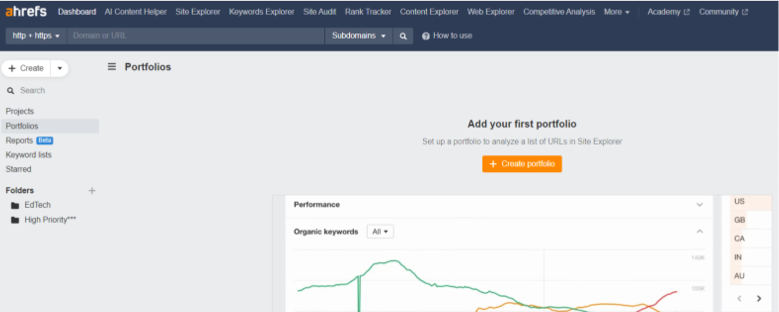
Ahrefs focuses on essential SEO metrics right away:
- Domain rating
- Organic traffic
- Backlink profile
- Keyword rankings
Verdict: While both dashboards are functional, I find Ahrefs’ interface more user-friendly, especially for those new to SEO tools. However, Semrush’s dashboard provides more comprehensive marketing data if you can handle the initial learning curve.
2. Ease Of Use
Using Semrush daily, I’ve noticed it requires more clicks to access certain features. For example, to check a competitor’s backlinks:
- Click on Domain Overview
- Enter the domain
- Navigate to Backlink Analytics
- Select the specific backlink metrics
However, Semrush compensates for this with excellent data visualization. Their graphs and charts make it easier to understand complex data and present it to clients.
With Ahrefs, I can usually access the information I need in fewer steps. For the same backlink check:
- Enter the domain in Site Explorer
- Click Backlinks in the left menu
The data loads faster in Ahrefs, and the interface feels more responsive. However, I’ve noticed it provides fewer visual representations of data compared to Semrush.
Verdict: Ahrefs wins for ease of use with its straightforward navigation and faster loading times. However, if you value detailed data visualization, Semrush might be worth the extra clicks.
3. Keyword Research
My experience with both platforms’ keyword research capabilities has revealed distinct approaches to helping users find the right keywords.
In Semrush, I often start with the Keyword Magic Tool, which has been invaluable for discovering comprehensive keyword opportunities. Recently, while working on a fitness equipment website, I found that Semrush not only showed me basic metrics but also revealed user intent behind searches – something that helped me tailor content more effectively.
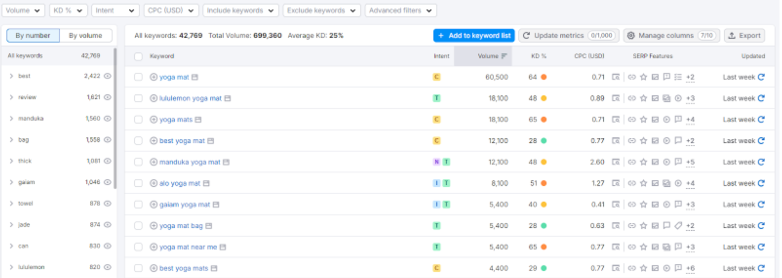
What I particularly value about Semrush’s keyword research is its ability to group keywords by intent. When I type in a seed keyword like “yoga mat,” it shows me whether people are looking to buy, seeking information, or comparing products. This feature has helped me create more targeted content that matches what users actually want to find.
Ahrefs approaches keyword research differently, and I’ve found its strength lies in its traffic potential metric. Rather than just showing search volume, it estimates how much traffic you could realistically get by ranking for a keyword.
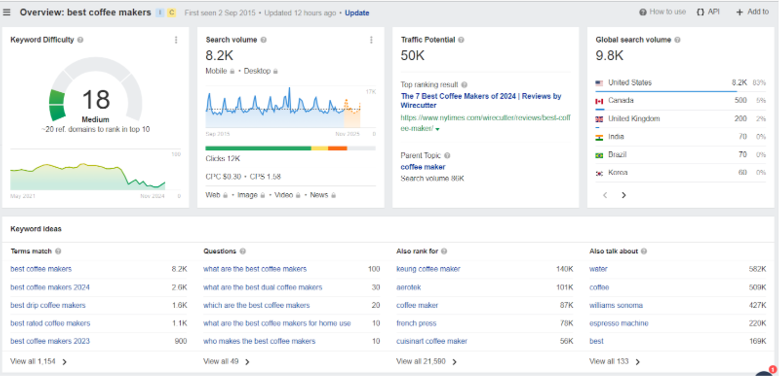
For instance, when researching “best coffee makers,” Ahrefs showed me that while the main keyword had 8,200 monthly searches, the topic could potentially bring in 50K visitors when considering related keywords.
Verdict: Semrush is the better choice if you need detailed search intent data and comprehensive keyword information. However, if your focus is on understanding potential traffic impact, Ahrefs’ traffic potential metric is unmatched.
4. Backlink Analysis
When it comes to managing link-building campaigns, both tools offer robust backlink analysis features but with different strengths.
Semrush has a massive database of 43 trillion backlinks, which often helps discover linking opportunities I might have missed otherwise. Last month, while analyzing a client’s competitor, Semrush revealed several high-quality backlinks that weren’t visible in other tools.
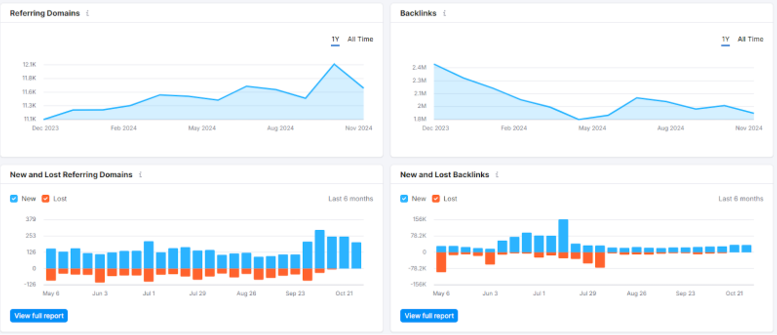
The platform’s toxic backlink detection has saved me countless hours of manual review. It automatically flags suspicious links based on various factors like spam patterns and domain quality. This feature proved particularly valuable when I was helping a client recover from a penalty, as it quickly identified problematic links that needed to be disavowed.
Ahrefs, drawing from its roots as a backlink analysis tool, offers what I consider more intuitive backlink exploration. Its interface makes it easy to dive deep into a site’s link profile and understand the quality of backlinks.
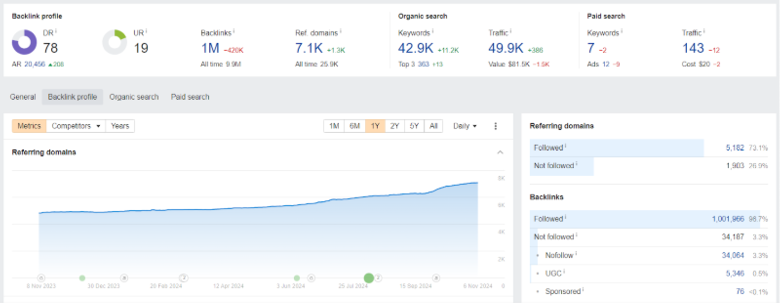
The broken link checker became one of my favorite features – just last week, it helped me recover several valuable backlinks for a client by identifying 404 pages that still had active backlinks pointing to them.
Backlink Analysis Verdict: While both tools excel in backlink analysis, I lean towards Ahrefs for its intuitive interface and detailed link metrics. However, if you’re actively building links or cleaning up toxic backlinks, Semrush’s larger database and toxic link detection make it the better choice.
5. Site Audit
Site auditing is where I’ve noticed some of the biggest differences between these tools. Semrush’s site audit goes beyond just identifying technical issues – it helps you understand their impact on your site’s performance. When I audit large e-commerce sites, I appreciate how Semrush categorizes issues by priority and provides clear explanations of how to fix them.
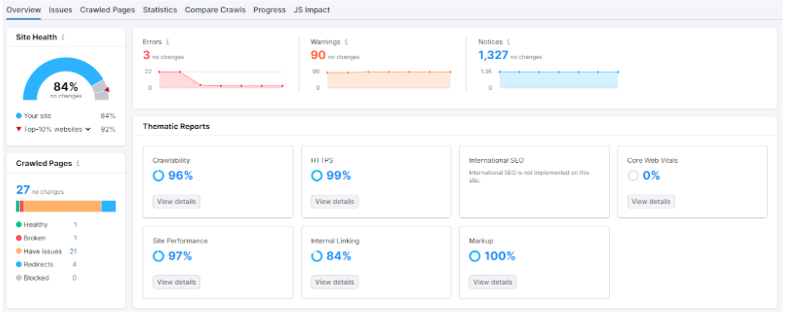
For instance, during a recent audit of a client’s website, Semrush identified critical issues with mobile usability and Core Web Vitals that were affecting their rankings. The tool provided specific recommendations for improvements, complete with code snippets and step-by-step instructions for fixing each issue.
Ahrefs takes a more straightforward approach to site auditing. While it might not offer as many technical details as Semrush, it excels at highlighting the most impactful issues first.
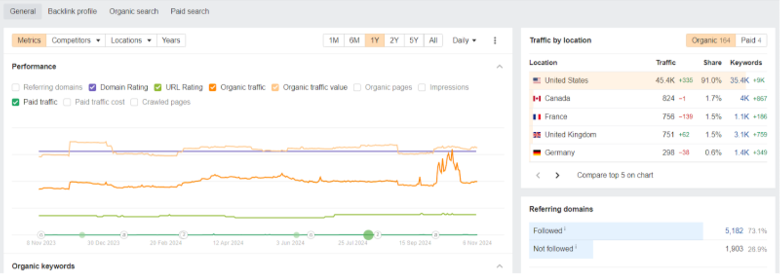
Its crawler is notably fast, and the reports are easy to understand. I often use Ahrefs for quick technical SEO checks when I need to get a general overview of a site’s health without diving too deep into technical specifics.
Verdict: For comprehensive technical SEO audits, especially for larger websites, Semrush is my go-to choice. Its detailed recommendations and prioritization system make it easier to action findings. However, for smaller sites or quick technical checks, Ahrefs’ straightforward approach and faster crawling speed make it a more efficient option.
6. Competitor Analysis
When analyzing competitors, Semrush has consistently impressed me with its comprehensive market insights. The tool goes beyond basic SEO metrics to show me the complete picture of a competitor’s digital presence.
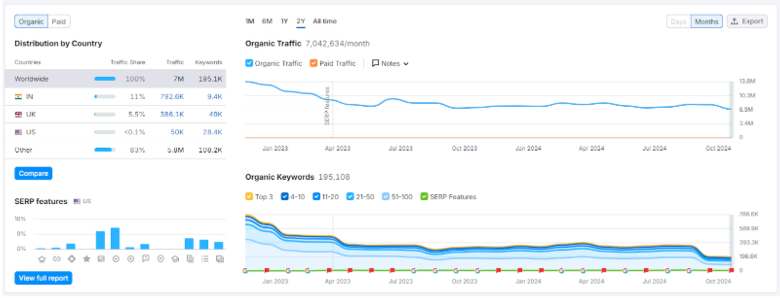
Recently, while helping a client in the fitness industry, I discovered valuable insights about their competitors’ paid advertising strategies, social media performance, and content gaps – all in one place.
The Market Explorer feature in Semrush has been particularly useful for understanding market dynamics. For instance, I can see seasonal trends, identify growing competitors, and spot market opportunities that might otherwise go unnoticed. This broader perspective has helped me devise more effective competitive strategies for my clients.
Ahrefs approaches competitor analysis with a more SEO-focused lens. Its Content Gap tool has helped me identify keywords that competitors rank for but my clients don’t.
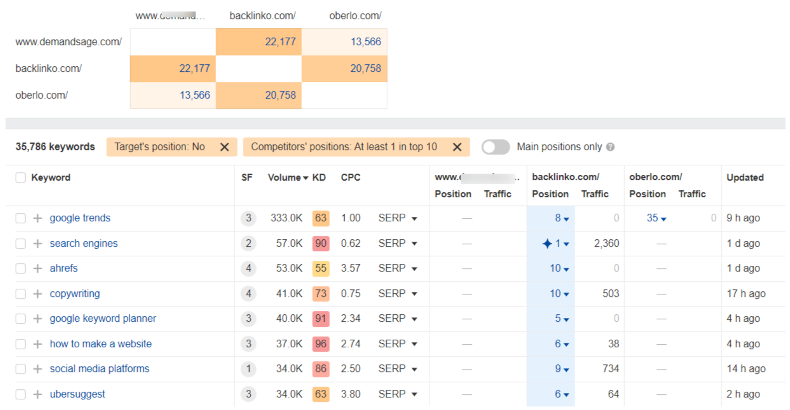
After analyzing my website against top competitors, I found many high-potential keywords that competitors were targeting successfully, which helped shape my content strategy.
Verdict: For comprehensive competitor analysis across all digital marketing channels, Semrush is the clear winner. However, if your focus is purely on SEO competition, Ahrefs provides adequate insights with a more straightforward approach. I typically use Semrush when I need a complete competitive landscape analysis and Ahrefs when focusing specifically on SEO opportunities.
7. Reports And Analytics
Semrush’s reporting has been particularly positive when working with clients who need regular updates. The platform allows you to create customized reports that combine various metrics and automatically send them to clients. The ability to generate white-label reports will help you maintain a professional image with your agency clients.
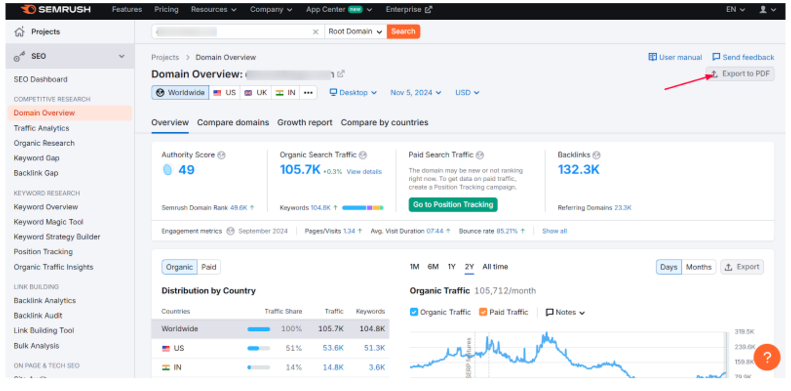
What I appreciate most about Semrush’s reporting is its flexibility. I can pull up to 3,000 reports daily on the Pro plan, which is more than enough for most needs. The data exports cleanly to various formats, and the integration with Google Data Studio has streamlined my reporting workflow considerably.
Ahrefs’ credit-based system takes a different approach to reporting. While the reports are clean and well-organized, I’ve found myself having to be more strategic about when and what I pull. For instance, with 500 credits on the Lite plan, I need to carefully plan my research and reporting to avoid running out of credits mid-month.
The good thing is that there is no credit system in other premium plans of Ahrefs, so you can generate reports and conduct research without worrying about expiring credits.
Verdict: For agencies or users needing frequent, comprehensive reports, Semrush is the better choice with its generous daily limits and customization options. Ahrefs, while providing excellent data quality, might be more suitable for individuals or smaller teams who don’t need to generate reports as frequently.
8. Domain Rating vs Authority Score
Through my experience working with various clients, I’ve noticed significant differences in how these tools measure domain strength.
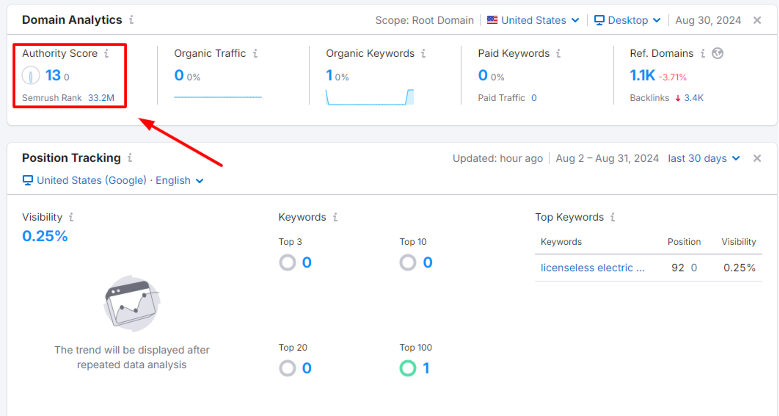
Semrush’s Authority Score takes a holistic approach, considering not just backlinks but also traffic patterns and engagement metrics. This has given me a more rounded view of a domain’s overall online presence.
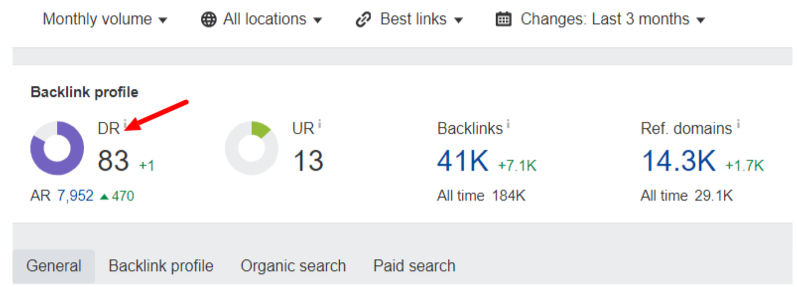
Ahrefs’ Domain Rating focuses primarily on the strength of a site’s backlink profile. I’ve found this particularly useful when specifically evaluating link building opportunities. For instance, when analyzing potential guest posting sites, Ahrefs’ straightforward approach to measuring domain strength helps me quickly identify valuable opportunities.
Verdict: If you need a comprehensive understanding of a domain’s overall digital authority, Semrush’s Authority Score provides better context. However, for pure backlink-based evaluation, Ahrefs’ Domain Rating offers a more focused metric. In my work, I often consider both metrics to get a complete picture of a domain’s strength.
Semrush vs Ahrefs: New Features & Updates
Let me walk you through the exciting new features both platforms have introduced recently.
Semrush’s Latest Features: The AI Content Generator helps create SEO-optimized content and meta descriptions. I’ve found it particularly useful for generating content ideas and improving existing articles. They’ve also introduced Impact Hero, a tool that tracks content performance and measures ROI across user journeys. This has helped me better understand how content impacts conversions.
Their local SEO tools have seen significant improvements too. The enhanced listing management now makes it easier to maintain consistent business information across different platforms. The review monitoring feature helps track and manage online reviews efficiently.
Ahrefs’ Recent Updates: The Site Explorer has undergone major improvements with enhanced traffic estimates and better SERP feature tracking. I’ve noticed the competitive analysis tools have become more accurate, helping me spot opportunities more effectively.
The Keywords Explorer database has expanded significantly, and the traffic potential metrics now provide more precise estimates. They’ve also introduced improved keyword clustering features that help create more focused content strategies.
Their free Webmaster Tools now include basic site audit capabilities and performance monitoring features. While limited compared to paid plans, these tools provide valuable insights for smaller websites.
Semrush vs Ahrefs: Pricing Plans
Let’s take a look at the pricing comparison of Semrush and Ahrefs:
Semrush Pricing Plans
Semrush pricing offers three main plans to its users:
| Plan | Monthly Price | Projects | Keywords | Daily Reports |
|---|---|---|---|---|
| Pro | $139.95 | 5 | 500 | 3,000 |
| Guru | $249.95 | 15 | 1,500 | 5,000 |
| Business | $499.95 | 40 | 5,000 | 10,000 |
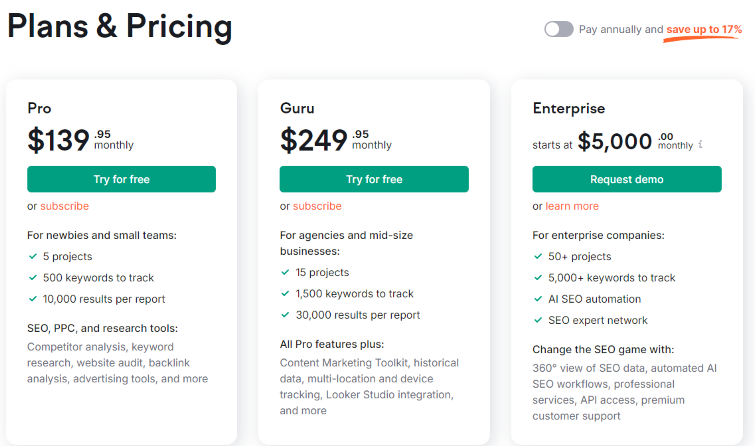
Pro Plan: $139.95/month
- Up to 5 projects
- Track 500 keywords
- 3,000 reports per day
- 10,000 results per report
- Basic features for SEO, content, and market research
Guru Plan: $249.95/month
- Up to 15 projects
- Track 1,500 keywords
- 5,000 reports per day
- Content marketing platform access
- Historical data since 2012
- Additional features for content and market research
Business Plan: $499.95/month
- Up to 40 projects
- Track 5,000 keywords
- 10,000 reports per day
- API Access
- Share of voice metrics
- Advanced features for agencies and enterprises
Ahrefs Pricing Plans
Ahrefs made a major update in its pricing. Now it is quite similar to Semrush’s. Let’s take a look at them:
| Plan | Monthly Price | Projects | Keywords | Monthly Credits |
|---|---|---|---|---|
| Lite | $129 | 5 | 750 | 500 |
| Standard | $249 | 20 | 2,000 | Unlimited |
| Advanced | $449 | 50 | 5,000 | Unlimited |
| Enterprise | $14,990/year | 100 | 10,000 | Unlimited |
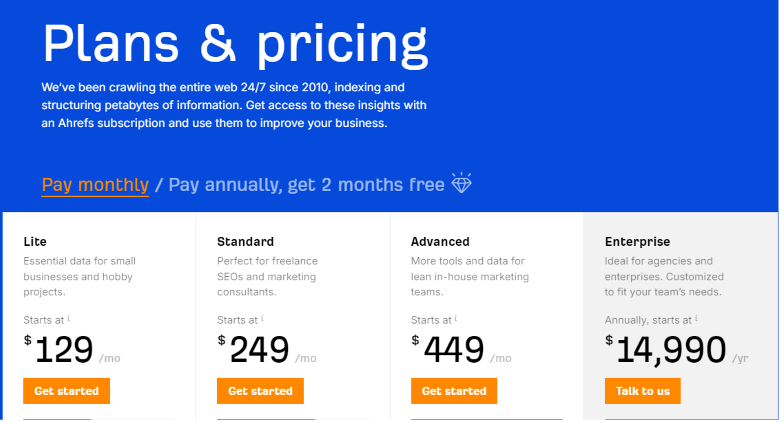
Lite Plan: $129/month
- 5 projects
- Track 750 keywords
- 500 monthly credits
- Core features access
- Site audit limited to 100k pages
Standard Plan: $249/month
- 20 projects
- Track 2,000 keywords
- Unlimited Credits
- Content explorer
- Historical data access
Advanced Plan: $449/month
- 50 projects
- Track 5,000 keywords
- API Access
- Unlimited site audit
- Advanced features access
Both platforms offer annual subscriptions with discounts – Semrush provides up to 17% off, while Ahrefs gives two months free with annual billing. Additionally, Semrush offers a 14-day free trial, while Ahrefs has discontinued their trial program but provides limited access through their free Webmaster Tools.
Which Platform To Choose?
Based on my extensive experience with both tools, here’s my recommendation:
Choose Semrush If You
- Need an all-in-one digital marketing solution
- Work with multiple clients requiring regular reports
- Focus heavily on content marketing
- Want comprehensive competitor analysis across all marketing channels
- Value detailed search intent data
Choose Ahrefs If You
- Primarily focus on SEO and backlink analysis
- Prefer a straightforward, user-friendly interface
- Need data from multiple search engines
- Want accurate traffic potential estimates
- Have a smaller team with focused SEO needs
Conclusion: Semrush Is An All-in-one Digital Marketing Tool, While Ahrefs Focuses On Core SEO
After years of using both platforms, I can confidently say there’s no absolute winner – it really depends on your specific needs. Semrush excels as a comprehensive marketing suite, while Ahrefs shines in core SEO functionality. I’ve found myself using Semrush more frequently for client work due to its broader feature set and reporting capabilities, but I still turn to Ahrefs when I need focused SEO insights or want to analyze multiple search engines.
Remember, both tools offer significant value, and your choice should align with your specific goals, team size, and budget. In many cases, starting with one tool and expanding to the other as your needs grow might be the most practical approach.